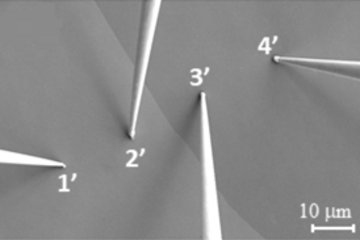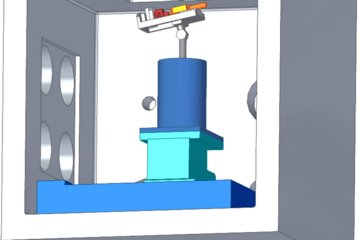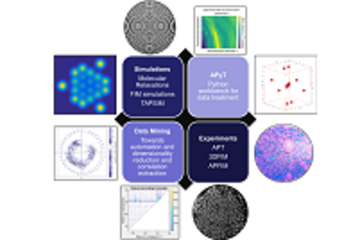All genres
1.
Journal Article
Isothermal oxidation behavior of TribaloyTM T400 and T800. npj Materials Degradation 2, 38 (2018)
2.
Journal Article
Effect of annealing on the size dependent deformation behavior of thin cobalt films on flexible substrates. Thin Solid Films 624, pp. 34 - 40 (2017)
3.
Journal Article
Strain-induced phase transformation of a thin Co film on flexible substrates. Acta Materialia 121, pp. 227 - 233 (2016)
4.
Journal Article
Effect of Microstructure on the Electro-Mechanical Behaviour of Cu Films on Polyimide. JOM-Journal of the Minerals Metals & Materials Society 68 (6), pp. 1640 - 1646 (2016)
5.
Journal Article
Adhesion measurement of a buried Cr interlayer on polyimide. Philosophical Magazine 95 (16-18), pp. 1982 - 1991 (2015)
6.
Journal Article
The influence of a brittle Cr interlayer on the deformation behavior of thin Cu films on flexible substrates: Experiment and model. Acta Materialia 89, pp. 278 - 289 (2015)
7.
Journal Article
Measuring electro-mechanical properties of thin films on polymer substrates. Microelectronic Engineering 137 (1), pp. 96 - 100 (2015)
8.
Journal Article
Ductile film delamination from compliant substrates using hard overlayers. Thin Solid Films 571 (P2), pp. 302 - 307 (2014)
9.
Journal Article
Recovery of electrical resistance in copper films on polyethylene terephthalate subjected to a tensile strain. Thin Solid Films 552 (3), pp. 141 - 145 (2014)
10.
Journal Article
Effects of processing on texture, internal stresses and mechanical properties during the pulsed electrodeposition of nanocrystalline and ultrafine-grained nickel. Acta Materialia 61 (11), pp. 3945 - 3955 (2013)
11.
Journal Article
Fragmentation testing for ductile thin films on polymer substrates. Philosophical Magazine Letters 93 (11), pp. 618 - 624 (2013)
12.
Conference Paper
Oxidation of Fe–Al alloys (5–40 at.% Al) at 700 and 900 °C. Materials Science Forum 879, pp. 1245 - 1250 (2017)
13.
Conference Paper
Electro-mechanical performance of thin gold films on polyimide. In: MRS Advances, Vol. 1, pp. 773 - 778. Materials Research Society (2016)
14.
Conference Paper
In-situ Tensile Straining of Metal Films on Polymer Substrates under an AFM. 2012 MRS Fall Meeting & Exhibit, Hynes Convention Center, Boston, MA, USA, November 25, 2012 - November 30, 2012. Materials Research Society Symposium Proceedings 1527, (2013)
15.
Talk
The wet and hot corrosion behavior of iron aluminides. THERMEC 2016 – Int. Conf. on Processing & Manufacturing of Advanced Materials
, Graz, Austria (2016)
16.
Talk
The mechanical behavior of thin cobalt films on polyimide. Arbeitskreistreffen Rasterkraftmikroskopie und nanomechanische Methoden, TU Darmstadt, Darmstadt, Germny (2015)
17.
Talk
In-situ stress measurements in thin films using synchrotron diffraction. Summer School: Theory and Practice of Modern Powder Diffraction, Tagungshaus Schönenberg, Ellwangen, Ellwangen, Germany (2014)
18.
Talk
In-situ stress measurements in Cu films using synchrotron radiation. "Mechanical Issues for Flexible Electronics" Flex Workshop, Erich Schmid Institut, Leoben, Leoben, Austria (2014)
19.
Talk
Computational simulation of cracking and buckling of thin metallic films on polymer substrate under tensile loading. "Mechanical Issues for Flexible Electronics" Flex Workshop, Erich Schmid Institut, Leoben, Leoben, Austria (2014)
20.
Talk
Effects of the film thickness on the deformation behavior of thin Cu films on polyimide. Arbeitskreistreffen Rasterkraftmikroskopie und nanomechanische Methoden, Max-Planck-Institut für Eisenforschung GmbH, Düsseldorf, Germany (2014)











